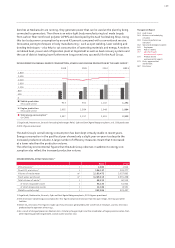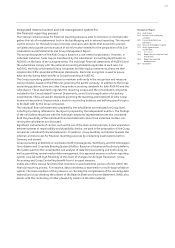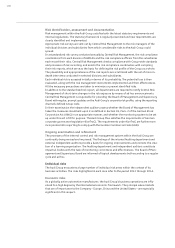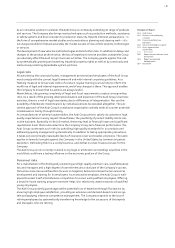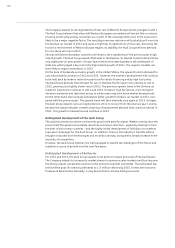Audi 2011 Annual Report Download - page 180
Download and view the complete annual report
Please find page 180 of the 2011 Audi annual report below. You can navigate through the pages in the report by either clicking on the pages listed below, or by using the keyword search tool below to find specific information within the annual report.
177
Management Report
134 Audi Group
143 Business and underlying
situation
159 Financial performance
indicators
162 Social and ecological aspects
175 Risks, opportunities
and outlook
175 Risk report
183 Report on post-balance sheet
date events
183 Report on expected
developments
187 Disclaimer
Integrated internal control and risk management system for
the financial reporting process
The internal control process for financial reporting purposes aims to minimize or eliminate alto-
gether the risk of misstatements both in the bookkeeping and in external reporting. The internal
control process for the Audi Group comprises measures and checks that ensure the prompt,
complete and accurate communication of all information needed for the preparation of its Con-
solidated Financial Statements and Group Management Report.
The accounting system of the Audi Group is based on a non-central organization. However, in
individual instances, tasks may be transferred by the subsidiaries’ accounting departments to
AUDI AG on the basis of service agreements. The individual financial statements of AUDI AG and
the subsidiaries comply with the national accounting standards applicable in each case. For
AUDI AG, the fully consolidated Group companies and the equity investments, these are then
adopted into IFRS consolidated financial statements. Electronic encryption is used to assure
data security during data transfer to Group Accounting at AUDI AG.
The Group accounting guideline serves to maintain uniformity in the recognition and measure-
ment principles, based on the IFRS rules governing the parent company. In addition to the Group
accounting guideline, there are other Group-wide accounting standards for both AUDI AG and the
subsidiaries. These standards regulate the reporting scopes and the consolidated companies
included in the Consolidated Financial Statements, as well as the application of statutory
requirements. There are specific standards governing the reporting and treatment of intra-Group
business transactions; these provide a basis for reconciling balances and defining specific topics
to be dealt with by the Group companies.
The individual financial statements prepared by the subsidiaries are evaluated at Group level,
including by making reference to the reports prepared by the independent auditors. The findings
of the concluding discussions with the individual companies’ representatives are also considered.
Both the plausibility of the individual financial statements and critical individual matters con-
cerning the subsidiaries are discussed.
Significant instruments of control, such as the use of the dual control principle, a clear separation
between spheres of responsibility and plausibility checks, are used in the preparation of the Group
companies’ individual financial statements. In addition, Group Auditing contributes towards the
internal control process for financial reporting purposes by conducting examinations both in
Germany and abroad.
Group Accounting at AUDI AG is coordinated with Volkswagen AG, Wolfsburg, and the Volkswagen
Consolidation and Corporate Steering System (VoKUs). Based on a future-proof technical platform,
the system permits the consolidation and analysis of data from Accounting and Controlling. As
well as permitting central master data management, this approach assures a uniform reporting
system coupled with high flexibility in the event of changes to the legal framework. Group
Accounting and Group Controlling benefit from it in equal measure.
VoKUs also offers various functions that minimize or avoid potential sources of error within the
financial reporting process. For instance, data consistency is examined in a multi-stage validation
system. The main emphasis of this process is on checking the completeness of the incoming data
material and cross-checking the content of the Balance Sheet and Income Statement. VoKUs also
assists with the conducting of other plausibility checks on the data material.




